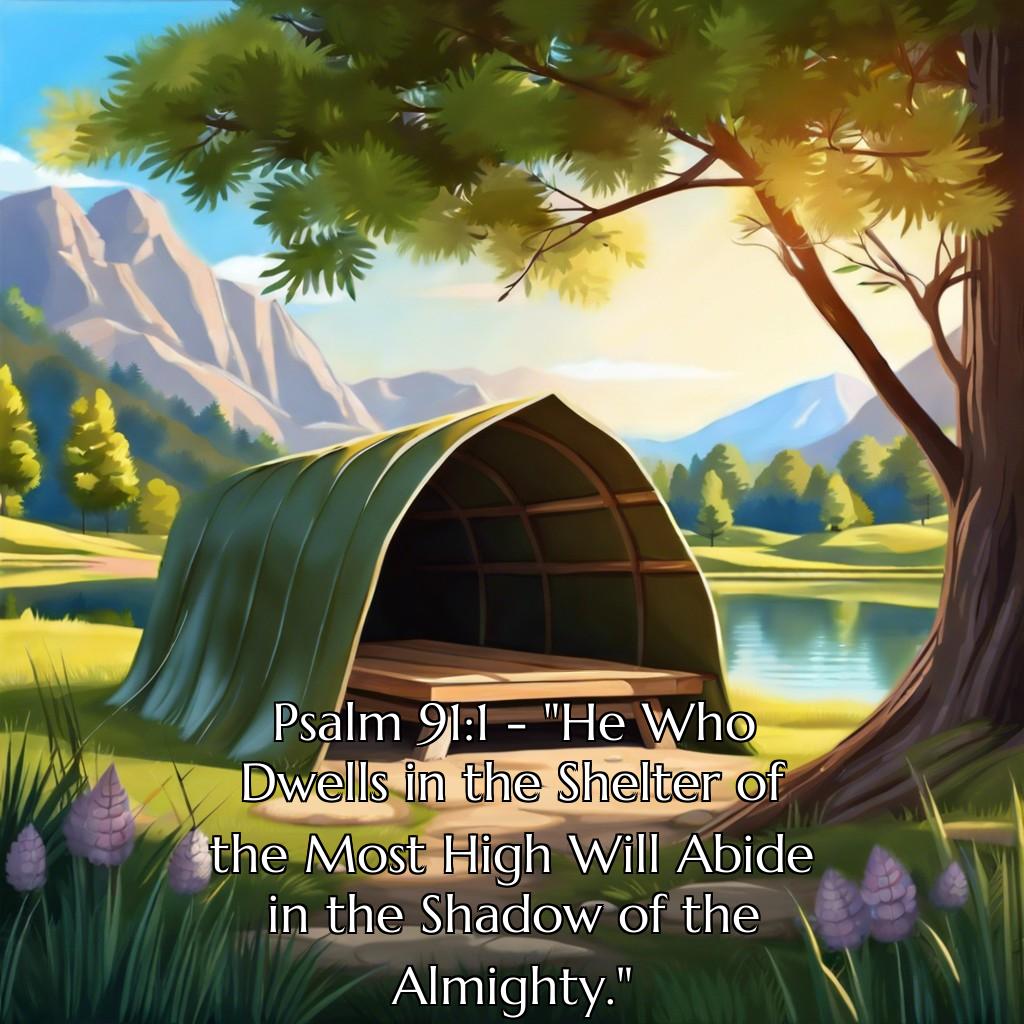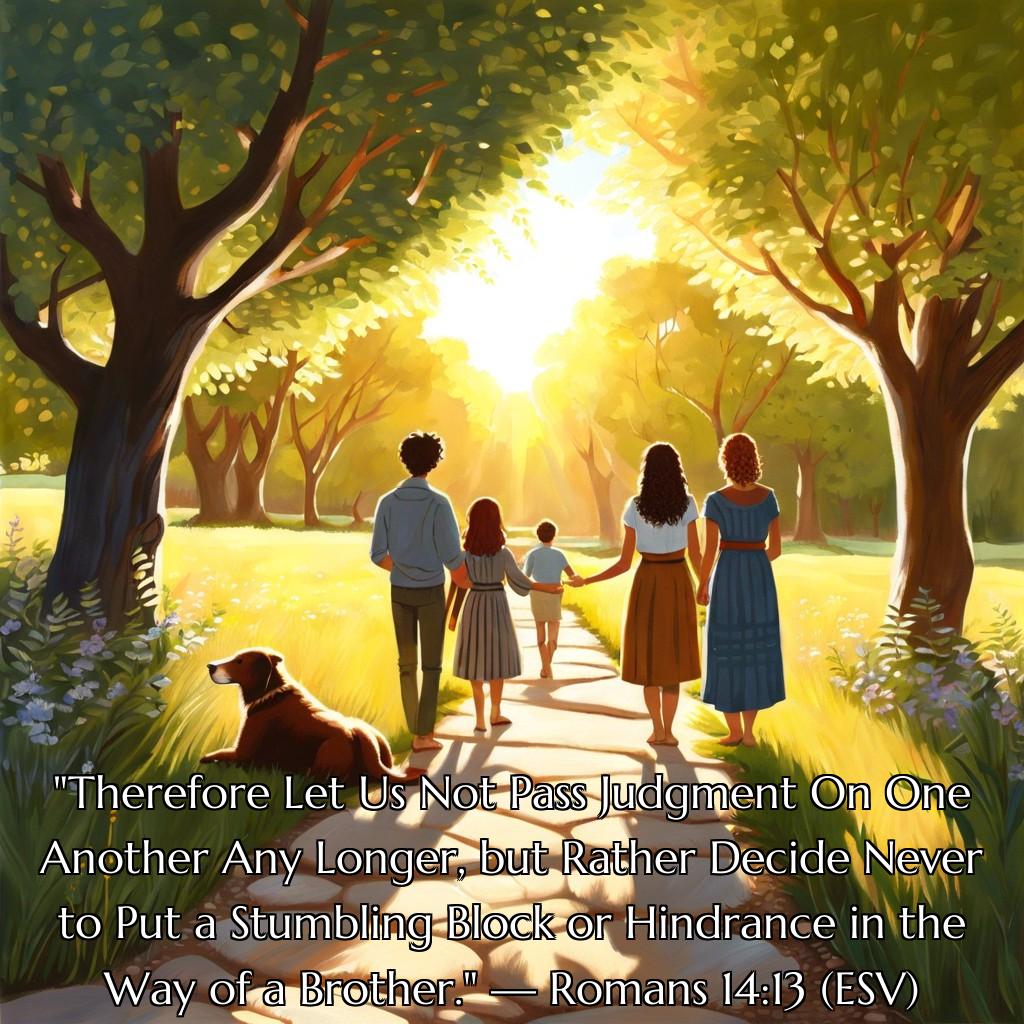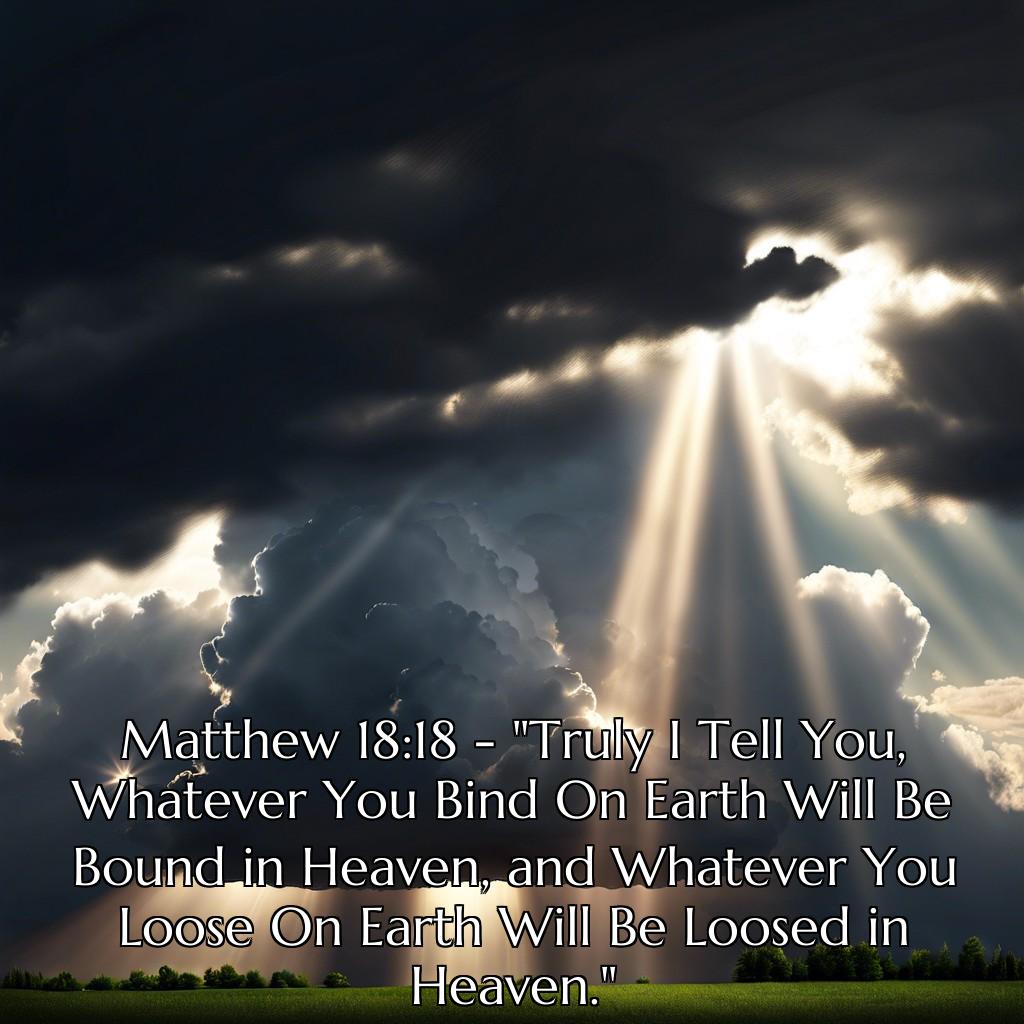This article provides explanations for some of the most unsettling Bible verses, giving you insights into their meanings and significance.
The Bible holds numerous verses that can evoke a sense of fear and awe in readers, challenging our perception of morality, judgment, and the consequences of our actions. If you’re seeking to understand or explore the more terrifying passages that delve into themes of eternal damnation, judgment, and divine retribution, this article covers some of the scariest Bible verses that offer profound, often unsettling reflections on the fate awaiting the unrighteous. Let’s delve into these scriptures and uncover their chilling meanings.
Matthew 25:30 – “And Throw That Worthless Servant Outside, Into the Darkness, Where There Will Be Weeping and Gnashing of Teeth.”
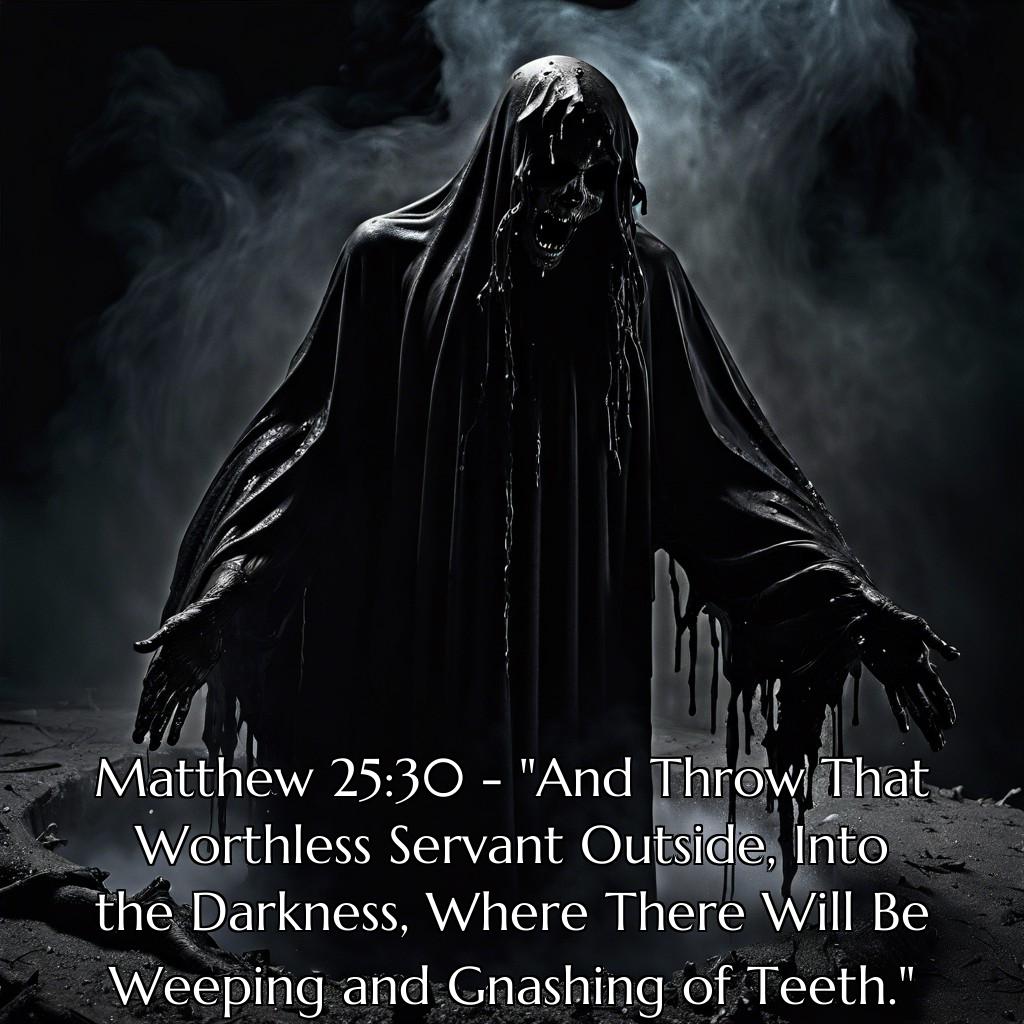
This verse brings a sobering message, often interpreted as a warning against complacency and lack of action. The servant in the parable is deemed “worthless” for failing to invest his master’s money wisely, demonstrating a larger lesson about accountability and the use of one’s gifts.
- Darkness: Symbolizes separation from God and loss of spiritual light.
- Weeping and gnashing of teeth: Emphasizes extreme regret and suffering resulting from poor choices.
- Worthless servant: Represents individuals who squander their opportunities to do good and serve others.
Jesus uses vivid imagery to stress the seriousness of not fulfilling one’s responsibilities and duties. The verse serves as a stark reminder to actively engage with our faith and contribute positively to the world around us.
Revelation 21:8 – “But the Cowardly, the Unbelieving, the Vile, the Murderers, the Sexually Immoral, Those Who Practice Magic Arts, the Idolaters and All Liars—they Will Be Consigned to the Fiery Lake of Burning Sulfur. This Is the Second Death.”
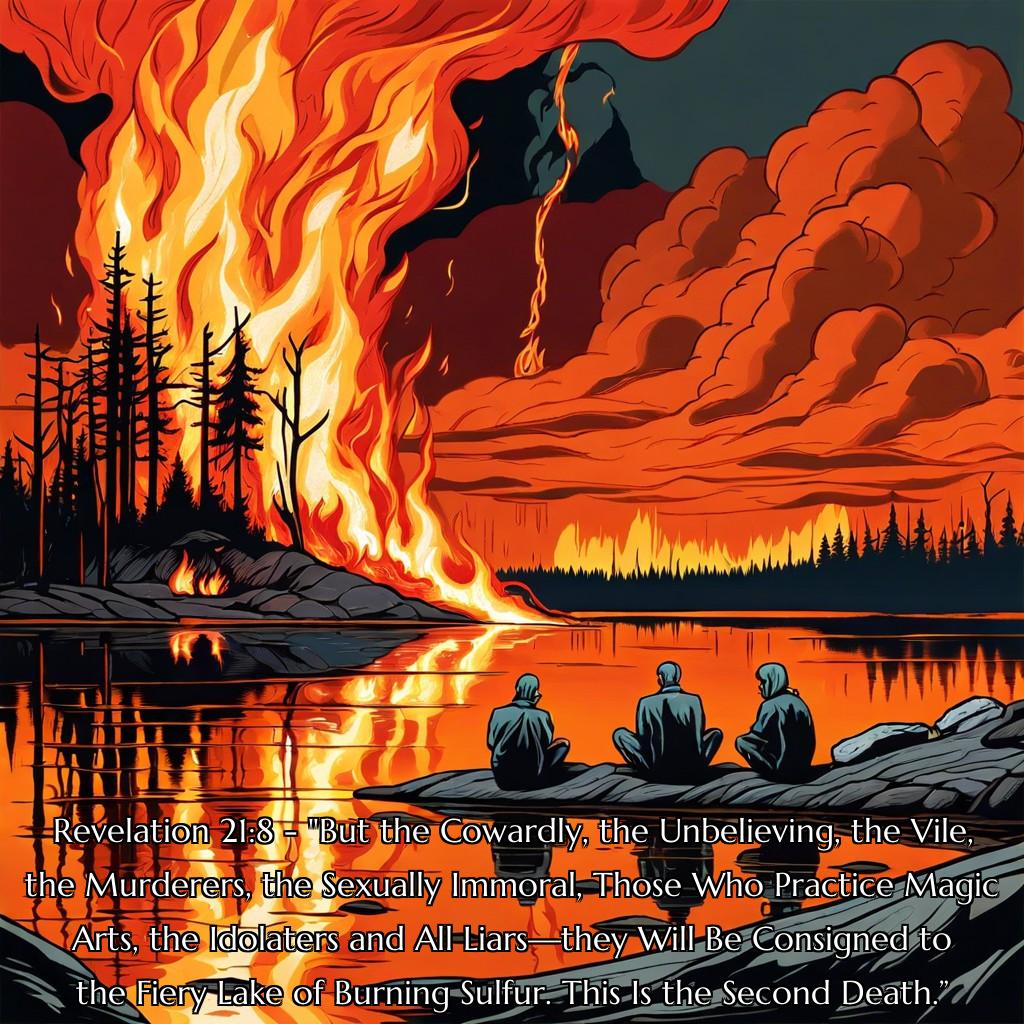
This verse from Revelation paints a vivid and unsettling picture of the fate awaiting those who reject God’s ways. It categorizes various sinful behaviors and traits that lead to this harsh judgement.
The “cowardly” refers to those who renounce their faith under pressure. “Unbelieving” is straightforward, highlighting the fate of those who refuse to trust in God.
“Vile” encompasses a broad range of morally repugnant behaviors, while “murderers” need no explanation.
The “sexually immoral” are those who engage in practices outside the biblical sexual ethics. “Magic arts” refers to practices like sorcery and witchcraft, condemned throughout Scripture.
“Idolaters” are those who worship anything other than the true God. Lastly, “all liars” encapsulates deceitfulness in all forms.
This verse starkly outlines the gravity of such actions: the “fiery lake of burning sulfur.” It serves as a powerful reminder of the importance of righteous living according to biblical teachings.
Matthew 13:50 – “And Throw Them Into the Blazing Furnace, Where There Will Be Weeping and Gnashing of Teeth.”
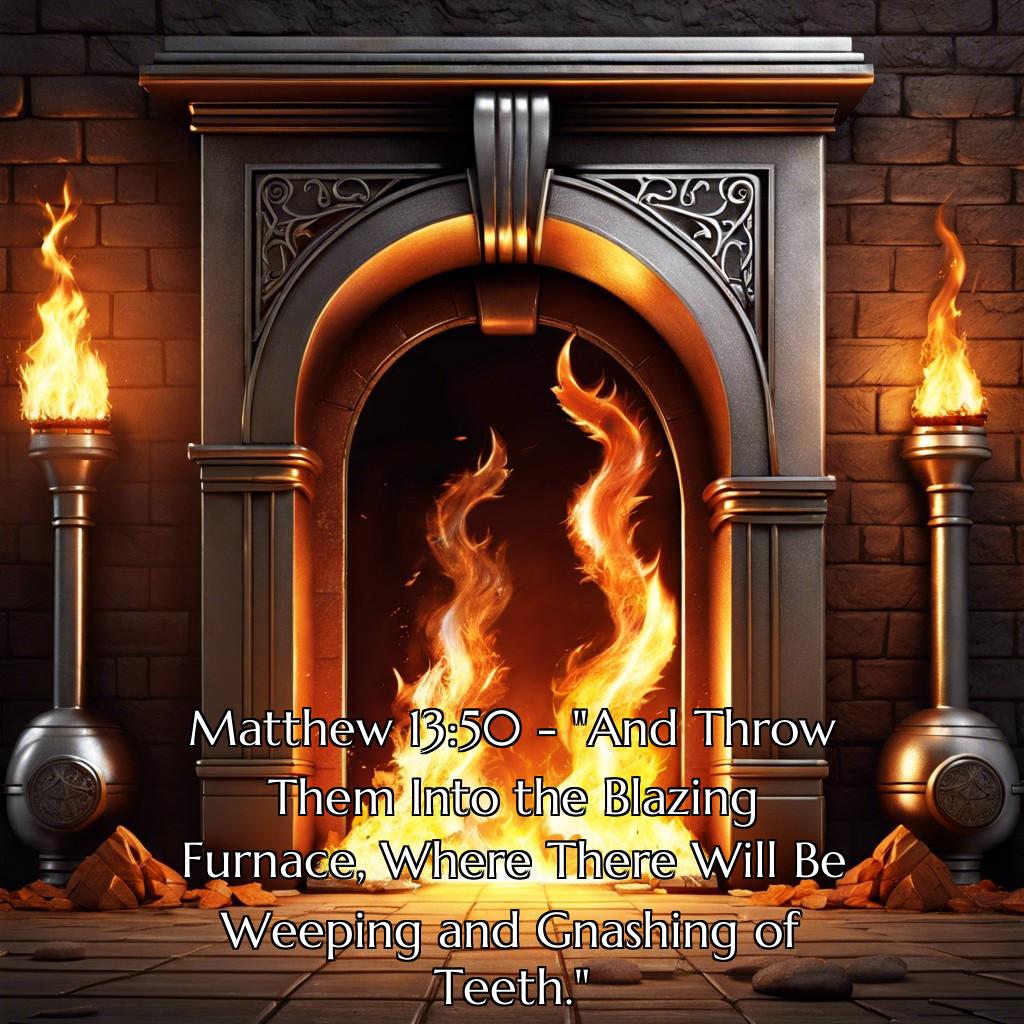
This verse showcases a vivid depiction of judgment and separation. It’s drawn from Jesus’ parable about the end times, where the wicked are separated from the righteous.
The “blazing furnace” symbolizes hell, a place of ultimate punishment and suffering.
“Weeping and gnashing of teeth” indicate intense grief and regret. It’s a way to stress the severity of being cast out from God’s presence.
This serves as a stark reminder of the fate that awaits those who choose to live unjustly. It highlights the importance of making righteous choices before it’s too late.
Hebrews 10:31 – “It Is a Dreadful Thing to Fall Into the Hands of the Living God.”
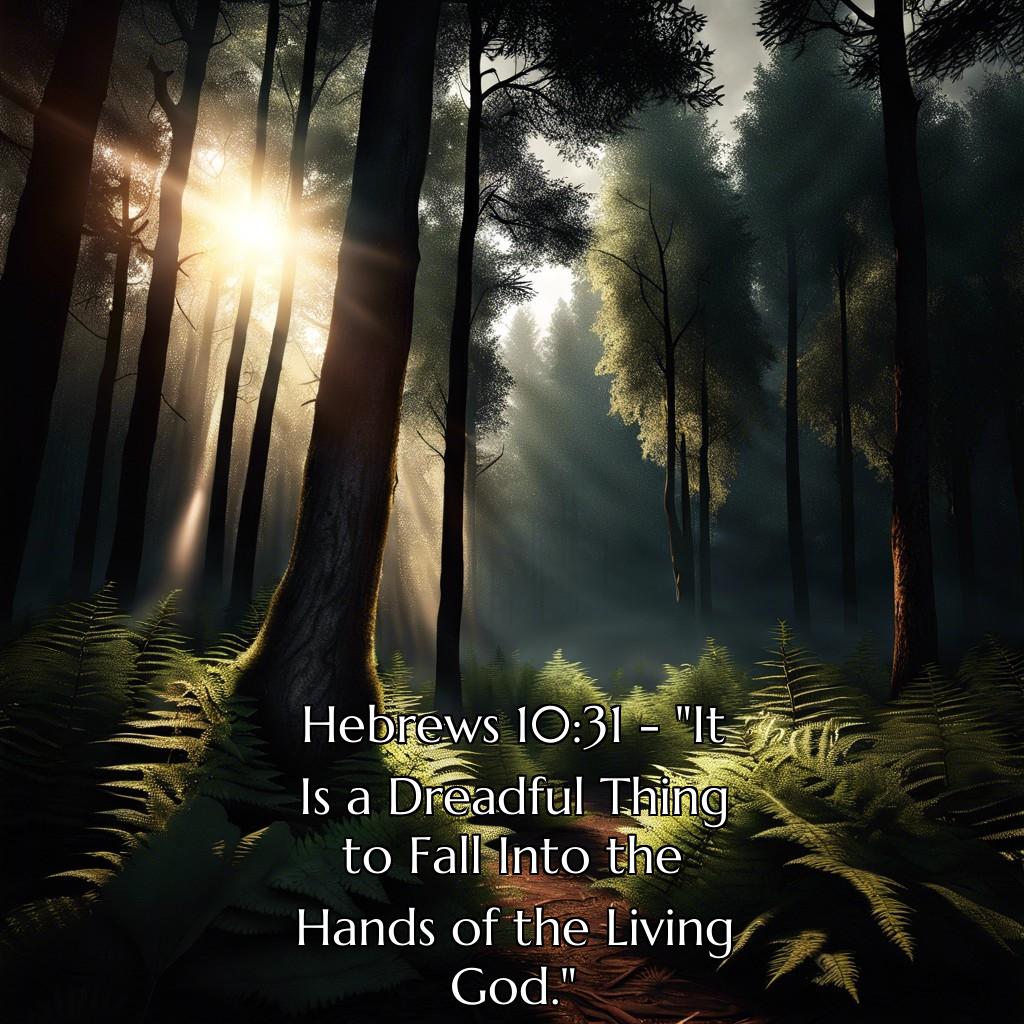
This verse strikes a note of divine justice and accountability. It paints a vivid picture of the seriousness of God’s judgment.
The “dreadful thing” refers to the awe-inspiring and fearsome reality of falling under God’s judgment without the covering of Christ’s sacrifice.
God’s power is absolute. His authority is unchallengeable.
God’s judgment is inescapable. No one can hide or flee from it.
Beyond human control, this verse urges us to live righteously. It portrays the living God as intensely involved in justice, which should prompt a reverent attitude towards Him.
Luke 13:27-28 – “But He Will Reply, ‘I Don’t Know You or Where You Come From. Away From Me, All You Evildoers!’ There Will Be Weeping There, and Gnashing of Teeth, When You See Abraham, Isaac and Jacob and All the Prophets in the Kingdom of God, but You Yourselves Thrown Out.”
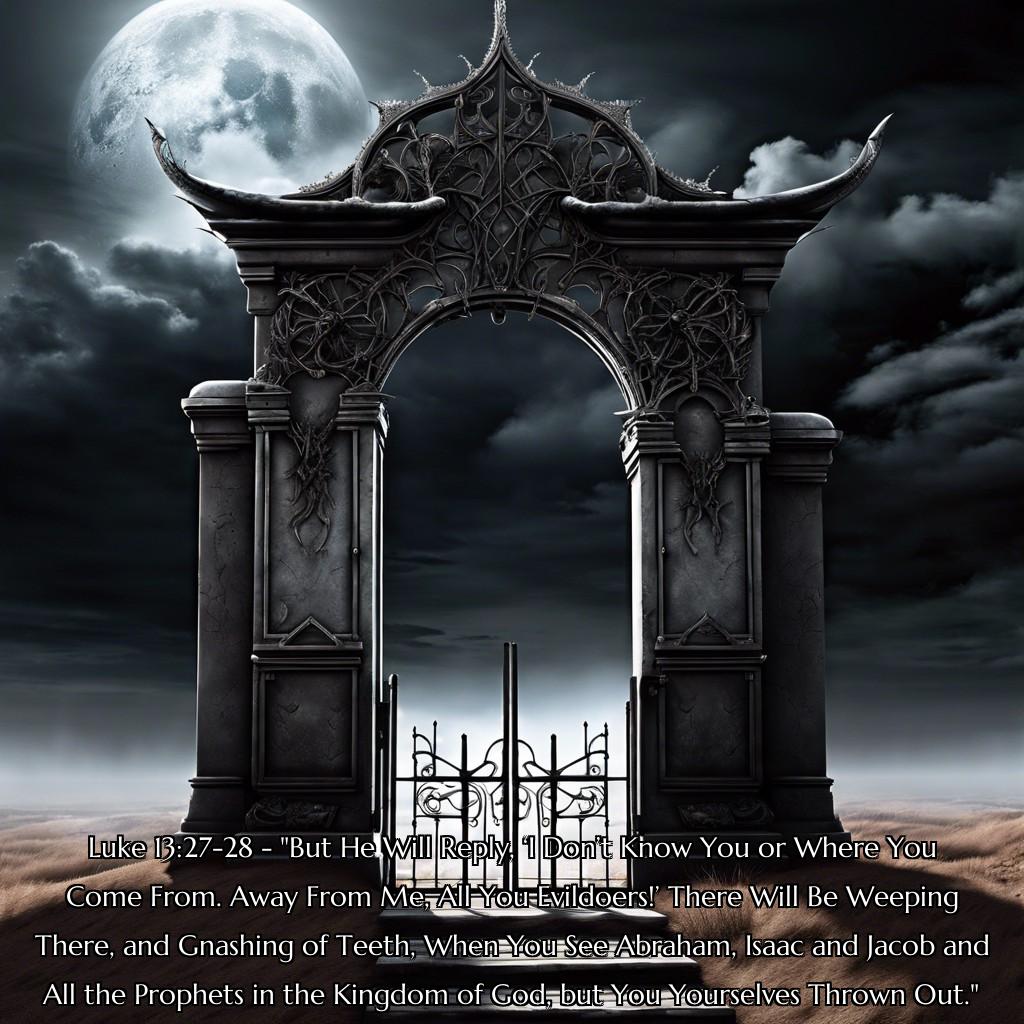
This verse delivers a vivid image of rejection and separation from God. It highlights the anguish of those who believed they were part of God’s kingdom, only to be cast out.
Several key points stand out:
- Divine Consequence: Being turned away by God carries a heavy emotional weight, demonstrated by the weeping and gnashing of teeth.
- False Assurance: Claiming faith isn’t enough; God desires genuine relationship and righteous living.
- Regret and Realization: Seeing patriarchs like Abraham, Isaac, and Jacob in God’s kingdom while being excluded emphasizes the torment of missed salvation.
It’s a call to sincere faith and introspection, urging believers to ensure their actions align with their professed beliefs.
Revelation 20:15 – “Anyone Whose Name Was Not Found Written in the Book of Life Was Thrown Into the Lake of Fire.”

This verse is both vivid and intense. It highlights the gravity of not being in alignment with God’s will. The “book of life” represents those who are saved, those who have accepted and followed the teachings and salvation offered through Jesus Christ.
The “lake of fire” is a daunting image. It symbolizes ultimate separation from God, a place of eternal punishment. This separation is not merely physical but spiritual, highlighting the seriousness of one’s spiritual decisions and actions during their earthly life.
The imagery used here serves as a warning. It underlines the importance of living a life that aligns with divine principles, emphasizing repentance and strong faith. The potential for such dire consequences is meant to stir a sense of urgency and reflection in believers.
This verse, like others in Revelation, is meant to provide a clear choice: follow God’s path and be saved, or risk eternal separation in the lake of fire. It encourages sincere introspection and commitment to one’s faith.
Mark 9:43 – “If Your Hand Causes You to Stumble, Cut It Off. It Is Better for You to Enter Life Maimed Than With Two Hands to Go Into Hell, Where the Fire Never Goes Out.”
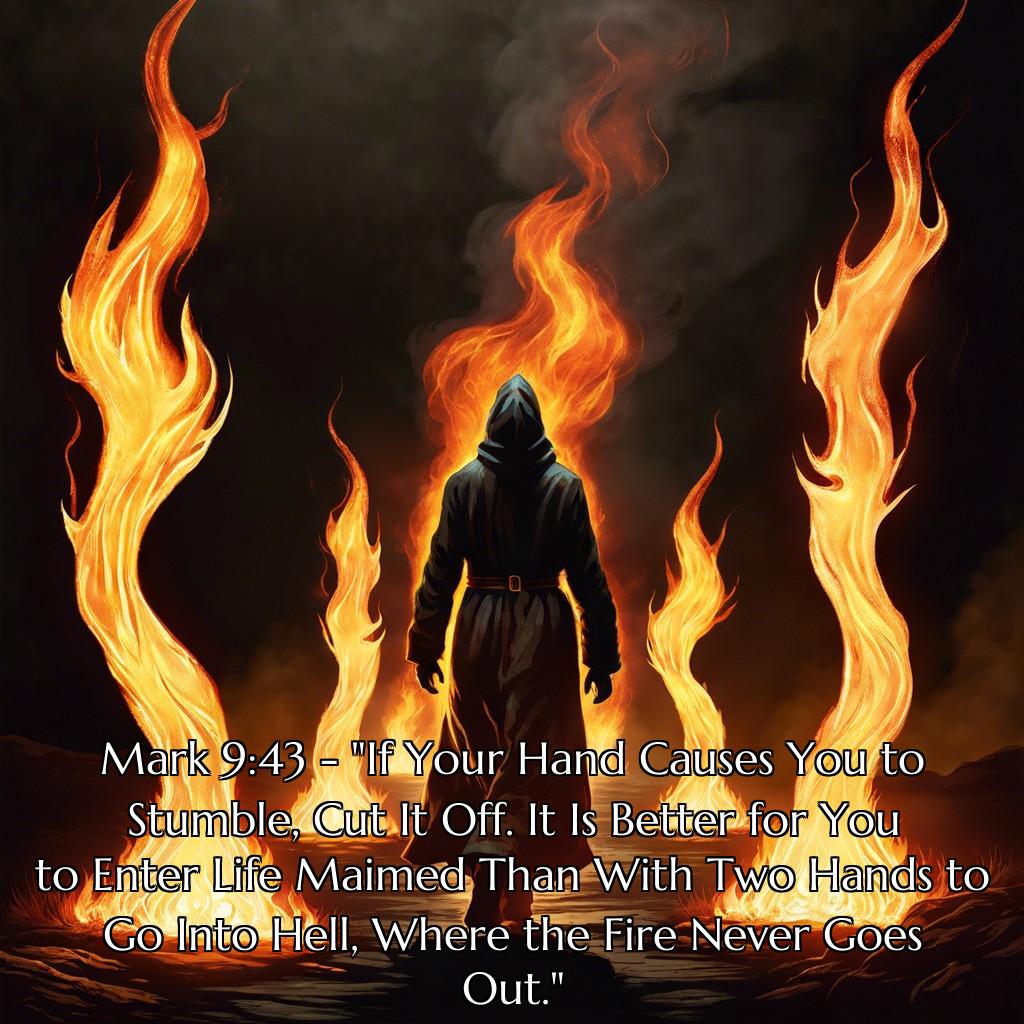
Jesus employs vivid imagery to stress the importance of avoiding sin. The verse isn’t a literal command but a hyperbolic statement to emphasize the drastic measures one should take to avoid spiritual downfall.
First, it highlights the severity of sin, suggesting it has dire consequences. By instructing believers to “cut off” a part of themselves causing sin, Jesus underlines the idea that nothing should stand between a person and their spiritual well-being.
Second, the verse contrasts earthly life with eternal life, underscoring that temporary discomfort or sacrifice is far more desirable than eternal suffering. The “fire that never goes out” serves as a stern warning about the potential eternal consequences.
Lastly, this passage impels self-examination. It urges people to scrutinize their actions and influences, making radical changes if necessary to align themselves more closely with God’s will.
2 Thessalonians 1:9 – “They Will Be Punished With Everlasting Destruction and Shut Out From the Presence of the Lord and From the Glory of His Might.”
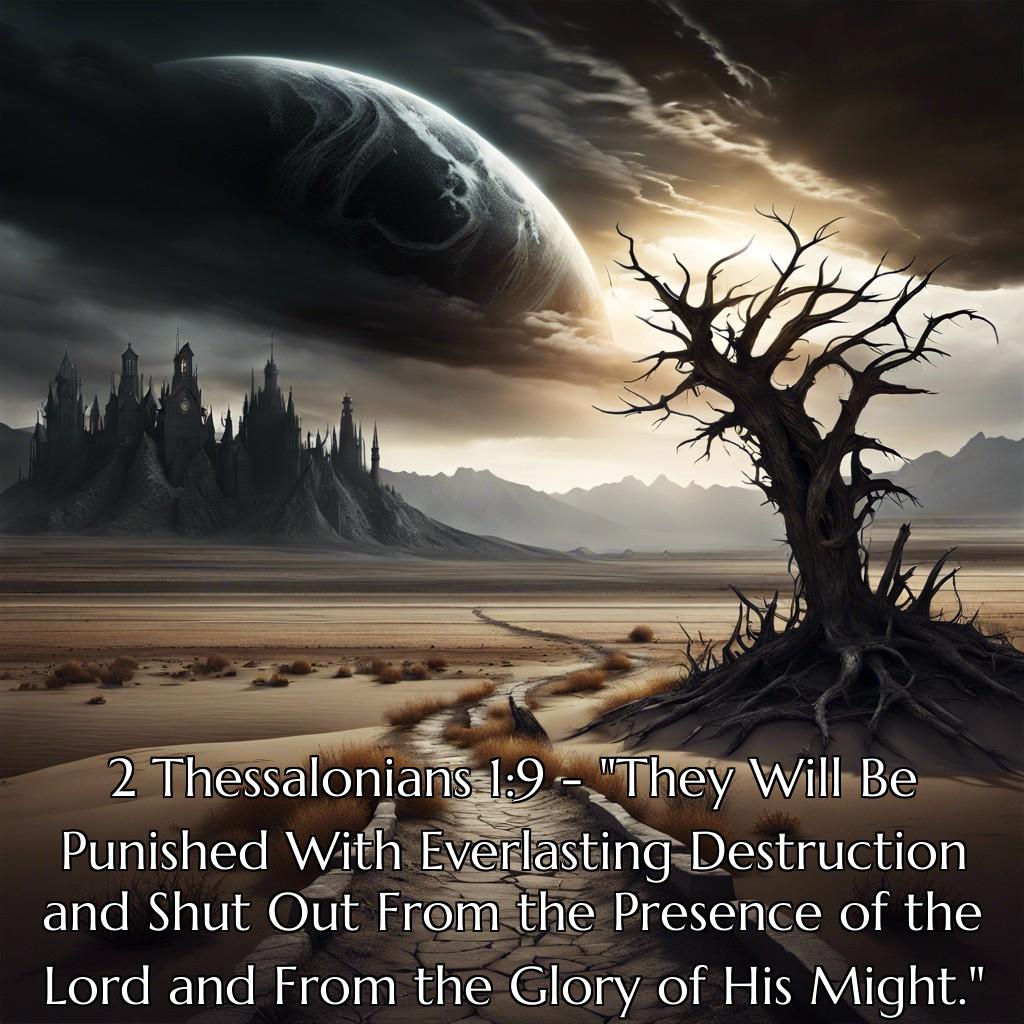
This verse vividly underscores the gravity of being separated from God. Here are some key points for understanding:
- Everlasting destruction: This refers to eternal separation from everything good, as opposed to temporary suffering.
- Shut out from the presence: Being cut off from God’s presence means losing all joy, peace, and hope.
- Glory of his might: It emphasizes missing out on the splendor and majesty of God’s power and love.
This verse serves as a caution about the seriousness of rejecting God’s offer of salvation. It’s a reminder to value and cherish a relationship with Him.
Matthew 10:28 – “Do Not Be Afraid of Those Who Kill the Body but Cannot Kill the Soul. Rather, Be Afraid of the One Who Can Destroy Both Soul and Body in Hell.”
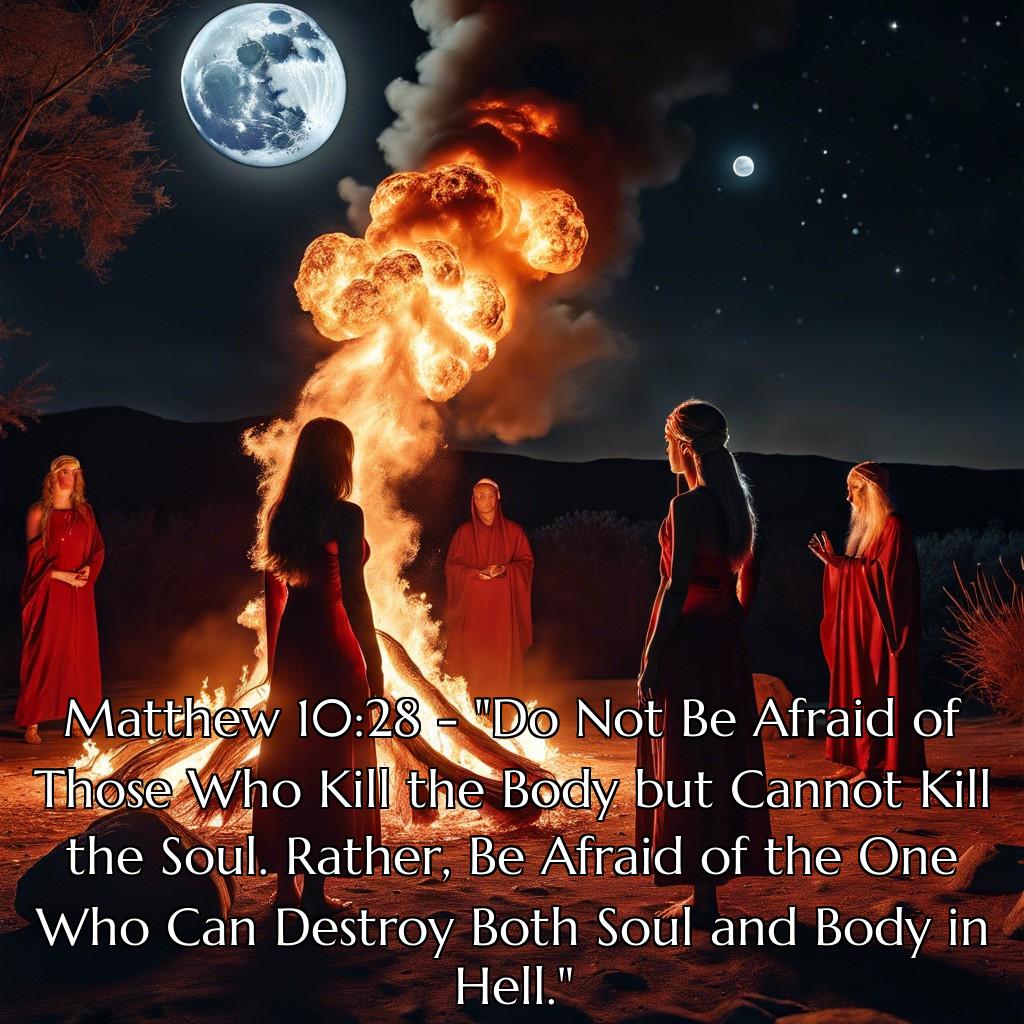
Focusing on ultimate authority, this verse emphasizes the distinction between mortal danger and spiritual peril. Here are key points from Matthew 10:28:
- It redirects fear from human threats to divine judgment.
- “Those who kill the body” signifies temporal, earthly dangers.
- The “One who can destroy both soul and body in hell” refers to God’s ultimate power over eternal destiny.
- It underscores the belief in an eternal soul, emphasizing its importance over physical life.
- The verse calls for reverence and respect towards divine authority rather than fearing mortal beings.
- It invites reflection on spiritual well-being and eternal consequences, urging faithfulness and vigilance.
This verse is a chilling reminder to prioritize our spiritual lives, keeping in mind the everlasting nature of the soul.
Jude 1:7 – “In a Similar Way, Sodom and Gomorrah and the Surrounding Towns Gave Themselves Up to Sexual Immorality and Perversion. They Serve As an Example of Those Who Suffer the Punishment of Eternal Fire.”
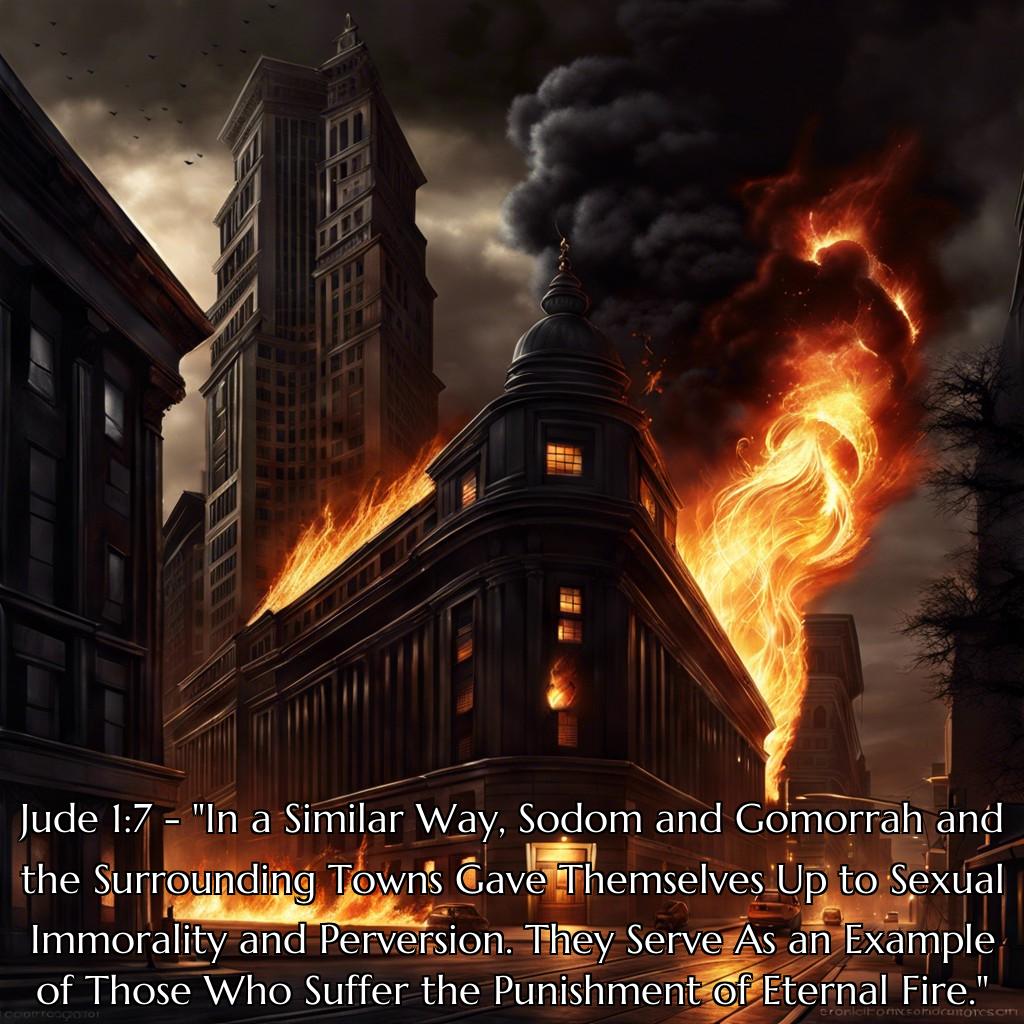
Jude 1:7 refers to the catastrophic judgment of Sodom and Gomorrah as a warning for those who indulge in immoral behavior. Here’s how to understand this verse:
- Historical Context: Sodom and Gomorrah were ancient cities known for their extreme wickedness, specifically sexual immorality.
- Divine Judgment: Their destruction by fire and brimstone serves as a stark example of God’s intolerance for sin.
- Eternal Consequences: The mention of “eternal fire” points to everlasting punishment, emphasizing the severity of turning away from God’s laws.
- Moral Reflection: This verse urges believers to examine their own lives and avoid the mistakes that led to the downfall of these cities.
This interpretation helps underscore the importance of living a life aligned with moral and spiritual principles.

